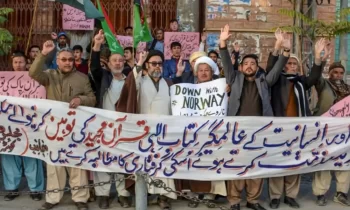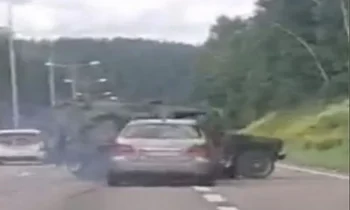This is the story of Priyangika Samanthie who is originally a Sri Lankan but was adopted by a Norwegian couple and was taken to Oslo. She helps individuals get reunited with their biological parents who were made victims of a sinister ‘adoption lobby’ running in Sri Lanka. And, her own story of reuniting with her biological mother is worth a read.
Priyangika was three when she stumbled upon the fact that she was an adopted child. When asked about how she got to know the reality, she revealed, “Before I answer this, I would like to tell you that some of the articles that are online are misleading; some of the information is not correct. I tried to make them change it but it is poor journalism. So, when I was three, I got to know about my adoption because I started having questions when my family and I went to the stores or anywhere else. I could tell that everyone has a relationship with their biological parents because they looked alike. And, I could sense that something was odd about our situation. And it got me thinking after which my adoptive parents started speaking to me about I having a second mom; which they did from an early age.”

She continued, “They always used to talk about me having three parents because they knew only about my biological mother and not my father. I specifically remember one instance when we went to the store, and I was lost because I went away from my adoptive mother. Then the cashier came over to me and asked me whether I needed some help. I had then asked her to help me find my mother. But after she took me back to my adoptive mother, I had started asking for my real mother. And, I had stated that I felt like I had been kidnapped. I used to shout on the streets saying that my adoptive parents stole me and this was something I used to say all through the years I grew up in. And I felt I was not supposed to be in Norway and that I wanted to go back home.”
Priyangika continued to narrate her tale, “We found mom in 2013, and then I had gone to Sri Lanka on Independence Day in 2014. But I had been searching for her since I was seven. So, I searched for over 12 years before I could meet her. The adoption law in Europe is that the adoptive parents are not allowed to assist the adoptees to reunite with their biological parents. And hence the adoptees have to find their families on their own. They can only give the adoptees the documents from the time they were adopted. But they may not reveal any kind of information about the whereabouts of the biological families or any tip-off which could help the adoptees to reunite with their actual parents. I am trying to get this changed now. By the age of five, my adoptive parents used to tell me about my adoption in detail because I always had a lot of questions on my mind regarding the documents and my situation. We used to sit and talk about my family in Sri Lanka and the legal process required to be followed.”
“Listening to my follow-up questions, my parents fathomed I was keener to know about my adoption as compared to my adoptive brother. Both of us are not biologically related; we were adopted from Sri Lanka. Then my adoptive parents showed me the documents such as birth certificates and films from the time they spent in Sri Lanka. But it was not enough information about my biological mother. So, at seven, I went to my adoptive father’s office, and I asked him to help me write to the Government to get access to my documents. My father could only help me write a letter to the reunification programme authorities but my application was declined, and I was told that one has to be at least 16 to begin looking out for biological parents. And the Government told me that I could not look into their files until I was 18. This was a huge problem,” mentioned Priyangika.
Taking a stroll down memory lane, she let us know, “I remember we had waited for a year to receive the authorities’ response and were shocked to know about the minimum age threshold. We used to wait near the mailbox every single day. Realising that my plea was declined, I went into severe depression. I became suicidal by the age of eight. At school, I used to go to the library and ask for books about Sri Lanka. I began writing letters to the authors asking them to help me find my mom. We had a lot of family friends who were Tamil; but as my brother and I were Sinhalese, they were skeptical to talk to us as it was the time of war in Sri Lanka. But they still contacted people in Sri Lanka but nobody could really find anything concrete. By the age of 13, everyone started telling me it seemed impossible for me to meet my mom.”
Remembering how she started helping other individuals to reunite with their families, she told us, “While I was looking for my mother, one biological mother contacted me as she thought I had been helping others to meet their families. In real, I was just helping myself. She mentioned her child was stolen and taken to Europe. At that point, I thought that something was odd. Nevertheless, we were lucky enough to find her daughter. Rumours about I helping others to get reunited continues to spread, and that is how I started doing that for real.”
It was while reuniting others and getting to know more Sri Lankans that Priyangika got to know about the hospital she was born in and the adoption centre in Colombo where she was kept. But the adoption centre was reluctant to give away any information regarding her mother. Even after striving hard, nothing could make her find her mother out and she had almost given up but carried on to help others to reunite. During her quest, she got to know about things like ‘baby farms’, acting mothers, and child kidnapping. But she continued to reckon that she was legally adopted as her adoptive parents had always told her of the court proceedings in her case. By the age of 18, she had assisted 100 reunions but still could not find her mom.
It was in 2012 that she had already given birth to a son, Nishant and she said that this was her first biological relationship. After it had been over 10 years of her trying to meet her mother, she had completely given up but yet she tried one last time. Priyangika turned to private sleuths in Sri Lanka and they could track her mother down.
Describing her reunion with mom, she divulged, “Even though I knew that something was odd about my adoption, I had thought that it would be extremely joyous to meet my mother. But to my surprise, she was reluctant even to look at me and felt shameful. Even though I kept on asking her innumerable questions, she was not ready to answer them. All she told me was that my father had passed away. She was traumatised. We spent a lot of time together over the next three weeks. She did not tell me much about my past but all she said was that I was not supposed to be taken away. I moved to Sri Lanka the next year.”
Revealing information about the ‘adoption lobby’, she let us know, “Adoption organisations in Europe have links to the birth countries of the children. Norway still has three such organisations. These organisations charge millions of rupees to finalise the adoption. They have contacts with individuals in the countries of birth who tell them about orphanages. Baby farms, kidnapping children from families, hospitals, or streets, babies found at the orphanages’ doorstep or given to them without the consent of the biological parents facilitate the illegal adoption lobby. Sometimes, parents are paid money and are falsely assured that the adoption is for a short time period so that they can stabilise their lives with the money but their children are never returned to them. Also, parents are deceived to believe that these orphanages are places where you can leave your kids and later pick them up again and meanwhile, those kids are given away.”
She also revealed, “The Government officials and lawyers can also be part of this lobby and stealthily make the adoptive parents believe that the adoption is legal. It is tough to understand this lobby if you do not see it on your own. Therefore, I have also worked in orphanages in Sri Lanka. Women are even paid to become ‘acting mothers’ and give away someone else’s child for adoption. These women are poor and are told that they can give a new life to the child by making them move to Europe to experience a better life, get access to better education to come back and help their own families. Babies are even swapped at hospitals to meet the needs of adoptive parents sometimes. Children are even claimed to be born dead.”
Explaining her own case, she said, “During her pregnancy, my mother was forced to live alone because of extremely traumatising circumstances with my father, his family, and their community. One of her family friends then fooled her to live with her. She had also persuaded my mother to give me away for adoption, but she did not give in even though she was poor. Right after my birth, the doctor asked her to give me away, but she was not ready. She took me home and asked my father to accept us, but he did not do so. That was when the ‘family friend’ came in again and she lied to my mother about ‘temporary adoptions’. She was told that she will be paid many lakhs of Rupees to hand me over to white parents and will stay in touch with me. And, when my adoptive parents showed her the images from Norway, she thought they were structures made by colonisers in Sri Lanka itself. And, my adoptive parents could not know that the lobby translator kept on referring to ‘temporary adoption’. And, such illegal cases are handled by ‘acting courts’ and hence, both biological and adoptive parents are fooled. Illegal documents are made as well. The fact that I left Sri Lanka is mentioned nowhere. Even the European governments are not obliged to scrutinise the documents closely.”
Priyangika also mentioned that she would now begin with legal action. She will be filing lawsuits against such orphanages in Sri Lanka either this or the next year; which depends on circumstances created by the pandemic. She will also file a lawsuit against the Norwegian Government later. She told us that while Sri Lanka has accepted the existence of this lobby, nobody from the Government has confessed to their role.
She has reunited people from different European countries, the USA, Australia to their families in Brazil, Colombia, and India in the past but mainly focuses on Sri Lanka now to dig deeper into one system. As per Priyangika, an industry based on children should not thrive. The Government should be responsible for its own children. And, the adoption racket has still not ended in Sri Lanka. New ways have been devised to continue to send children to foreign lands.
“The fraud has only changed its form; it has not ended,” she said. (Goa Chronicle)
( Daily news .lk )



